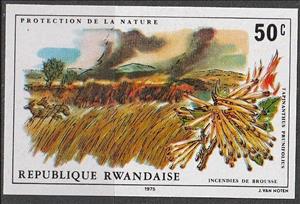Stamp: Tapinanthus prunifolius, Brush fire (Rwanda 1975)
Tapinanthus prunifolius, Brush fire (Rwanda 1975)
27 October (Rwanda ) within release Nature protection goes into circulation Stamp Tapinanthus prunifolius, Brush fire face value 50 Rwanda centime
| Stamp Tapinanthus prunifolius, Brush fire in catalogues | |
|---|---|
| Belgium: | Bel: RW 684ND |
Stamp is square format.
Also in the issue Nature protection:
- Stamp - Sabyinyo Volcano and Polystachya Kermesina face value 100;
- Stamp - Erosion prevention and Protea Madiensis face value 8;
- Stamp - Marsh and Melanthera Brownei face value 10;
- Stamp - Landscape, Lobelias and Senecons face value 26;
- Stamp - Tapinanthus prunifolius, Brush fire face value 50;
Stamp Tapinanthus prunifolius, Brush fire it reflects the thematic directions:
Animals are multicellular, eukaryotic organisms of the kingdom Animalia (also called Metazoa). All animals are motile, meaning they can move spontaneously and independently, at some point in their lives. Their body plan eventually becomes fixed as they develop, although some undergo a process of metamorphosis later on in their lives. All animals are heterotrophs: they must ingest other organisms or their products for sustenance.
The term antelope refers to numerous extant or recently extinct species of the ruminant artiodactyl family Bovidae that are indigenous to most of Africa, India, the Middle East, Central Asia, and a small area of Eastern Europe. Antelopes do not form a monophyletic group, as some antelopes are more closely related to other bovid groups, like bovines, goats, and sheep, than to other antelopes.
A better definition, also known as the "true antelopes", includes only the genera Gazella, Nanger, Eudorcas, and Antilope. One North American mammal, the pronghorn or "pronghorn antelope", is colloquially referred to as the "American antelope", despite the fact that it belongs to a completely different family (Antilocapridae) than the true Old-World antelopes; pronghorn are the sole extant member of an extinct prehistoric lineage that once included many unique species.
Environmental protection is the practice of protecting the natural environment by individuals, groups and governments.Its objectives are to conserve natural resources and the existing natural environment and, where it is possible, to repair damage and reverse trends.
A flame (from Latin flamma) is the visible, gaseous part of a fire. It is caused by a highly exothermic chemical reaction made in a thin zone. When flames are hot enough to have ionized gaseous components of sufficient density, they are then considered plasma.
Flora is the plant life occurring in a particular region or time, generally the naturally occurring or indigenous—native plant life. The corresponding term for animal life is fauna. Flora, fauna and other forms of life such as fungi are collectively referred to as biota. Sometimes bacteria and fungi are also referred to as flora, as in the terms gut flora or skin flora.




